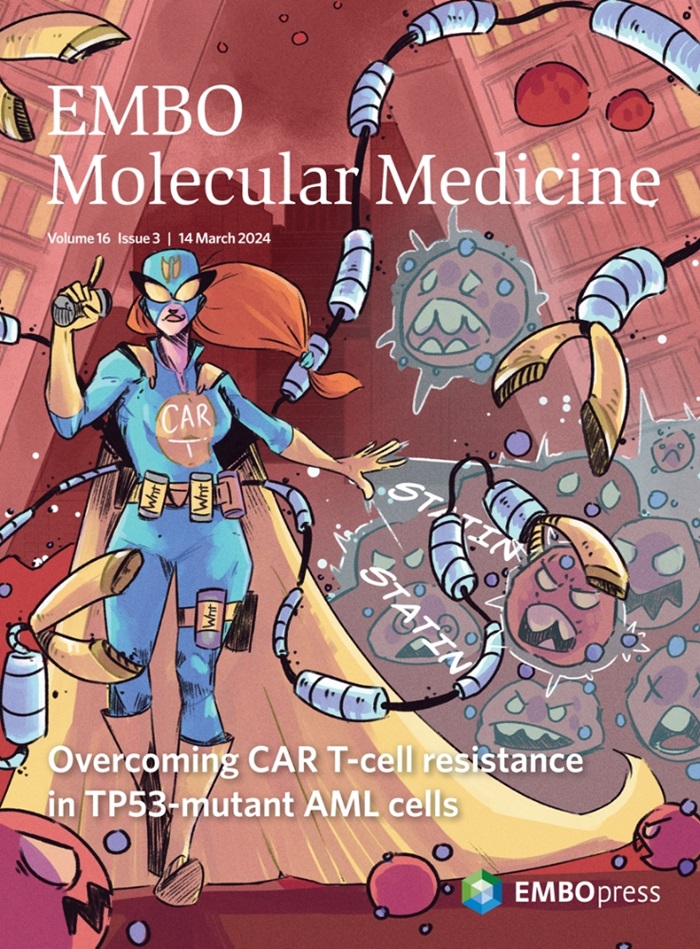甘氨酸脱羧酶通过嘧啶途径促进系膜细胞增殖,从而促进IgA肾病。
IF 8.3
1区 医学
Q1 MEDICINE, RESEARCH & EXPERIMENTAL
引用次数: 0
摘要
肾小球系膜细胞增生是免疫球蛋白a肾病(IgAN)的基本病理改变。本研究旨在阐明影响肾小球系膜细胞增殖的机制。生物信息学分析结合临床检测鉴定出关键分子甘氨酸脱羧酶(GLDC)。体外实验显示,GLDC敲低可降低pIgA对系膜细胞的增殖作用。嘧啶代谢参与GLDC对系膜细胞增殖的调节。此外,我们还发现GLDC对肾小球系膜细胞糖酵解的调控作用,进而影响肾纤维化的进展和肾小球系膜细胞的增殖。在敲低嘧啶代谢的关键限速酶CAD和DHODH后,GLDC的过表达失去了对糖酵解的调节作用。上述调节机制在体内通过抑制GLDC在肾脏中的表达得到证实。总之,GLDC上调嘧啶代谢通量,随后促进糖酵解,促进系膜细胞增殖,促进IgAN进展。本文章由计算机程序翻译,如有差异,请以英文原文为准。
Glycine decarboxylase advances IgA nephropathy by boosting mesangial cell proliferation through the pyrimidine pathway.
The proliferation of glomerular mesangial cells is a fundamental pathological change in immunoglobulin A nephropathy (IgAN). This study aims to elucidate the mechanisms that affect the proliferation of glomerular mesangial cells. Bioinformatics analysis combined with clinical detection identified the key molecule glycine decarboxylase (GLDC). In vitro experiments revealed that GLDC knockdown reduces the proliferative effect of pIgA on mesangial cells. Pyrimidine metabolism is involved in the proliferation regulation of mesangial cells by GLDC. Additionally, GLDC's regulation of glycolysis in mesangial cells was discovered, which further affects the progression of renal fibrosis and the proliferation of glomerular mesangial cells. Upon knockdown of the key rate-limiting enzymes of pyrimidine metabolism, CAD and DHODH, the overexpression of GLDC lost its regulatory effect on glycolysis. The regulatory mechanisms described above were confirmed by inhibiting GLDC expression in the kidneys in vivo. In conclusion, GLDC upregulates pyrimidine metabolic flux, which subsequently fuels glycolysis to promote mesangial cell proliferation, promoting IgAN progression.
求助全文
通过发布文献求助,成功后即可免费获取论文全文。
去求助
来源期刊

EMBO Molecular Medicine
医学-医学:研究与实验
CiteScore
17.70
自引率
0.90%
发文量
105
审稿时长
4-8 weeks
期刊介绍:
EMBO Molecular Medicine is an open access journal in the field of experimental medicine, dedicated to science at the interface between clinical research and basic life sciences. In addition to human data, we welcome original studies performed in cells and/or animals provided they demonstrate human disease relevance.
To enhance and better specify our commitment to precision medicine, we have expanded the scope of EMM and call for contributions in the following fields:
Environmental health and medicine, in particular studies in the field of environmental medicine in its functional and mechanistic aspects (exposome studies, toxicology, biomarkers, modeling, and intervention).
Clinical studies and case reports - Human clinical studies providing decisive clues how to control a given disease (epidemiological, pathophysiological, therapeutic, and vaccine studies). Case reports supporting hypothesis-driven research on the disease.
Biomedical technologies - Studies that present innovative materials, tools, devices, and technologies with direct translational potential and applicability (imaging technologies, drug delivery systems, tissue engineering, and AI)
 求助内容:
求助内容: 应助结果提醒方式:
应助结果提醒方式:


